| Srl | Item |
| 1 |
ID:
193633
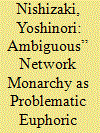

|
|
|
|
|
| Summary/Abstract |
Frequently cited in the literature on recent Thai politics, Duncan McCargo’s influential “network monarchy” concept is nonetheless inadequately developed. As such, it has been questioned and challenged by several scholars in recent years. In his 2021 Pacific Affairs article, McCargo rebuts many of these scholars’ arguments and defends his concept. His defence is unpersuasive, however. It falls short of elaborating on the scope, composition, and modus operandi of network monarchy, leaving the shortcomings of his original concept unrectified. Most seriously, McCargo now accentuates the “ambiguous” quality of network monarchy—a quality he did not emphasize originally—in order to accommodate new empirical anomalies and counter his critics. By so doing, he renders his argument unfalsifiable. Drawing on Robert Cribb’s thoughts, this article first spells out why or how the insufficiently developed network monarchy concept has become so widespread in the first place. It then examines the untenable nature of McCargo’s rejoinder to his critics, especially to Eugénie Mérieau.
|
|
|
|
|
|
|
|
|
|
|
|
|
|
|
|
| 2 |
ID:
120512


|
|
|
|
|
| Publication |
2013.
|
| Summary/Abstract |
In this article the extent to which political variables can explain the behaviour of constitutional judges in Italy when dealing with conflicts between the central government and regions is explored. Two competing hypotheses are tested. One hypothesis argues that one should expect some alignment between the political preferences of the judges and the success of the central government primarily due to the appointment mechanism. The other hypothesis suggests that there should be no systematic alignment between the political preferences of the judges and the success of the central government. Unlike previous literature, the empirical results presented in this article seem to confirm that when the Rapporteur and the court's majority are allegedly affiliated with the Prime Minister's coalition, the odds of success of the Prime Minister go up.
|
|
|
|
|
|
|
|
|
|
|
|
|
|
|
|
| 3 |
ID:
190812
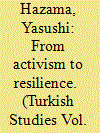

|
|
|
|
|
| Summary/Abstract |
This article discusses the behavior of the Constitutional Court in Turkey. As the highest court in the country, it is responsible for many decisions that have shaped the course of Turkish politics over the past six decades. It begins with a brief overview of the institutional features of the Turkish Constitutional Court. It then looks at major arguments on constitutional review, including judicial independence and court-curbing. Finally, it examines change and continuity in the attitudes of the Court based on the speeches of its presidents. One conclusion is that the Constitutional Court has transformed itself from that of the defender of the state principles to that of the defender of human rights while retaining its role with regard to the separation of powers. This transformation has been driven by both internal and external pressures: the domestic transition of tutelary democracy to competitive authoritarianism and the equivocation of domestic laws with international treaties.
|
|
|
|
|
|
|
|
|
|
|
|
|
|
|
|
| 4 |
ID:
185143
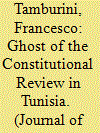

|
|
|
|
|
| Summary/Abstract |
The existence of a constitutional control is the essential cornerstone in any democratic system. Without a constitutional justice it is impossible to maintain a pluralist democracy with a real rule of law. The Tunisian constitutional history is emblematic of the relevance of the constitutional review. This article outlines the difficult and hampered life of the Tunisian constitutional justice that crossed two authoritarian regimes: a “revolution”; and the transition to democracy. It is in the latter phase that the creation of the constitutional court proved to be the paramount element in the passage from a procedural democracy to a substantive democracy.
|
|
|
|
|
|
|
|
|
|
|
|
|
|
|
|
| 5 |
ID:
075072


|
|
|
|
|
| Publication |
2006.
|
| Summary/Abstract |
Within the framework of the 1993 constitution, and in a political context deprived of stable parties, can the Russian Constitutional Court be strong enough to rebuild a balanced constitutional system? The early days of the Constitutional Court were deeply marked by the tumultuous political situation of the early post-Soviet period. The Court had to show self-restraint in order to avoid any further politicisation and is still not able to directly sanction presidential legal acts. But case law also reveals a progressive evolution of its means of action. The Court has adapted methods of control and is participating in the stabilisation and democratisation of the new state.
|
|
|
|
|
|
|
|
|
|
|
|
|
|
|
|
| 6 |
ID:
100315
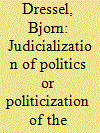

|
|
|
|
|
| Publication |
2010.
|
| Summary/Abstract |
Courts are becoming major players in the political landscape of Southeast Asia. This paper seeks to examine the causes and consequences of this new trend with particular reference to Thailand. Our study primarily analyzes the behavior of the Thai Constitutional Court during the political crisis in 2006-2008; the findings suggest that recent judicial activism and assertiveness in political matters, while partly explained by the interests of judges themselves and by the constitutional rules guiding their activities, is best understood as a direct consequence of the intervention of the monarchy, to which the judiciary has traditionally been closely aligned. Accordingly, the Thai case not only provides new evidence about what may be driving the new judicialization trend, it also draws attention to problematic aspects of this trend, namely the gradual politicization of the Thai judiciary and with it the erosion of the rule of law in Thailand and its replacement with rule by law. Our findings may also illuminate some larger issues at the intersection of politics and the courts throughout the region in ways that advance the theoretical understanding of both.
|
|
|
|
|
|
|
|
|
|
|
|
|
|
|
|
| 7 |
ID:
100265
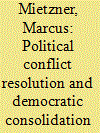

|
|
|
|
|
| Publication |
2010.
|
| Summary/Abstract |
This article argues that Indonesia's Constitutional Court has played a significant role in that country's transformation from a violence-prone polity into Southeast Asia's most stable democracy. The Court has advanced institutional conflict resolution mechanisms and expanded democratic rights-two achievements identified by Linz and Stepan as major indicators of a consolidating democracy. Building on models developed by Ginsburg and Horowitz, my analysis also illustrates why the Court has been able to defend its autonomy and become an agent of democratization. While sharing Ginsburg's emphasis on high levels of power diffusion as a key reason for the Court's success, this article moves beyond such an approach. Most importantly, it suggests that the judges' "judicial activism"-as expressed in a number of controversial but popular decision-increased Indonesian society's support for the Court to such an extent that is has now become largely invulnerable to attempts of external intervention.
|
|
|
|
|
|
|
|
|
|
|
|
|
|
|
|
| 8 |
ID:
109036
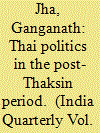

|
|
|
|
|
| Publication |
2011.
|
| Summary/Abstract |
hailand has been witnessing political uncertainties ever since the ouster of Prime Minister Thaksin Shinawatra. Although the 1997 Constitution of Thailand was one of the best in terms of evolving democratic institutions and Thaksin was one of the most popular leaders, yet the system could not work. Thaksin was disliked by the traditionally entrenched elite who joined together to remove him arbitrarily from power in which the military and the Royal Privy Council took a prominent part. The system that was adopted under military rule did not like to retain the 1997 constitution but decided to replace them with a new constitution (2007), in which the interests of the military were protected and promoted. In the evolving permutations and combinations, two groups-Yellow Shirts and Red Shirts-have emerged to oppose each other, often violently, to offer thesis and anti-thesis for and against Thaksin and his brand of politics. This article has tried to understand the dynamics of power politics in Thailand, the rise of the Yellow Shirts and Red Shirts and the emerging problems that Thailand will have to address in the future.
|
|
|
|
|
|
|
|
|
|
|
|
|
|
|
|
| 9 |
ID:
190037
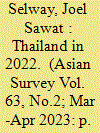

|
|
|
|
|
| Summary/Abstract |
Thailand’s military-aligned government saw its popularity plummet in polls throughout 2022. Yet former head of the armed forces and current prime minister Prayut Chan-o-cha was resilient in the face of mass party defections, a falling-out with his fellow party leader and long-time friend Prawit Wongsuwon, a censure debate, and even a constitutional court case threatening to remove him from office. The mass street protests that were a constant feature of the previous three years evaporated as conservative forces used the controversial Section 112 Royal Defamation Law to silence the various movements’ leaders. Political attention was focused on the impending elections, which shook up the party system with rampant party mergers and switching. Meanwhile a return to the 2011 electoral rules fueled talk of another Pheu Thai landslide in the next elections. The economy began to improve with the relaxing of COVID rules and the return of tourism, throwing a lifeline to a rapidly sinking Prayut, who himself switched to a new political party before the year’s end.
|
|
|
|
|
|
|
|
|
|
|
|
|
|
|
|